#there's a lot more examples
Explore tagged Tumblr posts
Text

Happy one year anniversary to In Stars and Time!
#ISAT#in stars and time#siffrin#loop#I truly mean it when I say that this was the best game I have played since Disco Elysium.#It pulls off some of the best examples of Ludonarritive Harmony in a video game...possibly ever?#Not to mention just...wow. What a great story. What a tale of twists and introspection. What a tale about the need for home and connection#I know many of you have trusted me before with media recommendations. Trust me one more time.#Do you want to experience the torment of being in a timeloop? And *still* have fun and feel like your time is being respected?#PLAY IN STARS AND TIME!#Do you yearn for complex characters and love unravelling mysteries? PLAY IN STARS AND TIME!!!!#Please heed the content warnings; I took them a little too lightly on my playthrough! They are there for a reason! Don't be like me!#This game means a lot to me and so many others. On the small chance the dev sees this (they are on tumblr after all):#Thank you so much for all your hard work in creating this game and seeing the project through.#It has been a year for us fans but many years for you. So thank you!#I hope it has been a joyful year for you! Watching as people descend into shrieks of agony from playing your game.#It's good! It made me vomit blood. I had so much fun! I felt like I was torturing the protagonist when I played it. I loved it! I cried.
3K notes
·
View notes
Text



I have a LOTT of sketches I could post rn but these 2 are recent and I'm fond of them <3 Steph costume ideas and Tim/Damian cringe bickering inspired by Batman: Brave and the Bold #18!
#dc comics#dc#damian wayne#stephanie brown#tim drake#been drawing more self indulgent doodles lately which is nice#these r sort of a part of that lol#i drew the tim and damian one back when that stort actually came out it's. definitely interesting#if only for portraying Tim and Damian as equally flawed individuals (contrasted to the zdarsky batman for example)#AND unintentionally highlighted how low-key embarrassing it is that Tim is still robin. it's got a part two coming out sometime this month#and the Steph doodle was inspired by me rereading her batgirl run since the trade came out! and remembering how hard Lee Garbetts art slayed#but yeah while i figure out what to post and how- have this#the tim and damian one got like 3 likes on the bird app meanwhile the Steph one is at 1.3k w 93 bookmarks#say what you will about the bird app but when you get the right ppls attention that place does NOT have to be batboy centric#(or soley batboy centric. i like them a lot (damian mainly) but the variety is nice compared to here)
1K notes
·
View notes
Text
Part four of old GF sketches
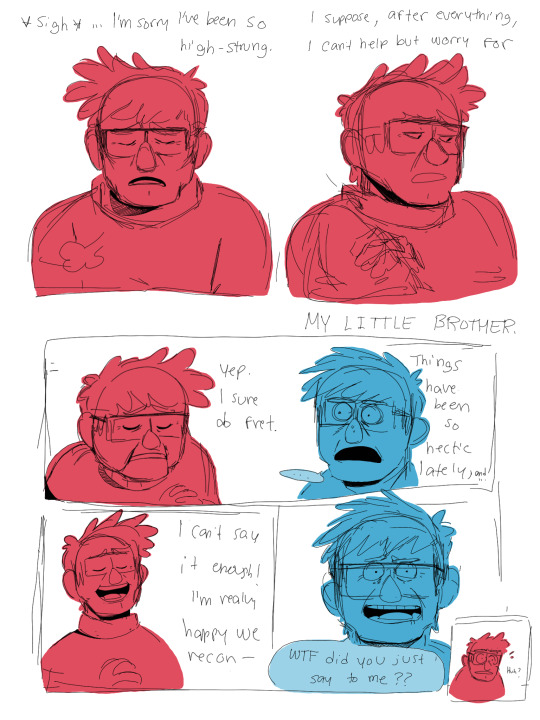

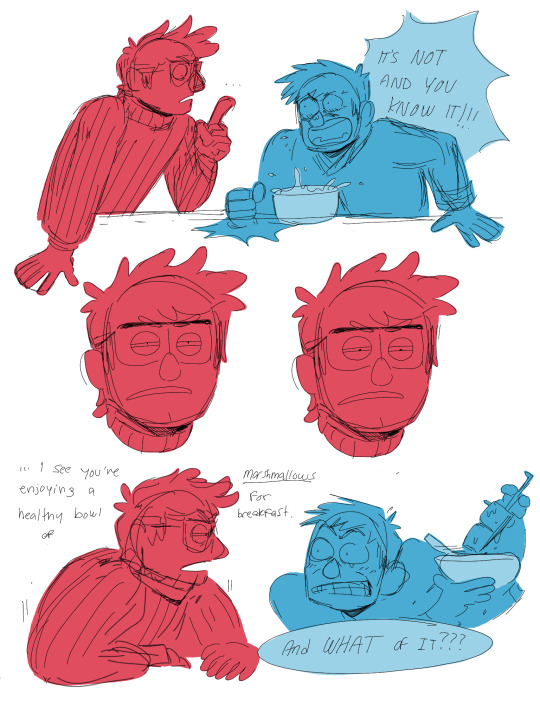
The twin thing, Stan and Ford edition
#fanart#gravity falls#stanley pines#stanford pines#i saw a lot of posts pushing the big/little sibling titles on these two when I was drawing this#i won't say it's irrelevant to their characters#(though it comes up way less with Dipper and Mabel)#but as someone with a twin and other siblings very close in age#I've only used 'big/little' instead of 'older/younger' as a joke#other families definitely care more than us#so my opinion is that Ford cares very much about being the 'older' sibling that sets the example and has a respectable title#and Stan has never thought about Ford in these terms in his life#being in their late fifties/sixties just makes it worse for him
1K notes
·
View notes
Text
ngl, I'm beginning to take issue with how in conversations about anti-intellectualism almost automatically, the face of girls and women will be slapped on the problem.
#'all those tiktok girls who only like marvel films and' - why do you always say girls and women? are the guys filling opera halls instead?#'women in their mid 20s who still only read YA novels' okay sure that's an example and relevant discussions can be had#but it reminds me of the mocking tone in which people speak of 'chick-lit' to use women's interest as an indicator of lower value#while in fact women are reading more than men in EVERY single genre of fiction. Women are doing a lot of (often unpaid) labour#supporting libaries supporting theatres supporting cultural events#meanwhile there is a pretty big overlap between toxic masculinity and anti-intellectualism#(especially misogyny and homophobia)#especially when it comes to things like ballet or opera or musical or generally dance#in fact it is often the female investment in specific things that makes them less 'valuable' in general consciousness#for thousands of years the theatre was well-respected and a high form of art - and now it's a 'wife-thing'#the father who will teach his son that theatre and dance are for girls - how is that never an example for anti-intellectualism
17K notes
·
View notes
Text




meaningful work: transgender experience in the sex trade
#transmisogyny#misogynoir#transmisogynoir#these statistics dont paint the entire picture theres a lot more in the paper#for example trans men report higher rates of suicidality (likely due to transphobia specifically but could also be selection bias)#but overall it paints a surprisingly clear picture of transmisogyny along with misogynoir and other forms of racism intersecting with#misogyny. worth taking a look at#the sec trade really elucidates transmisogyny in so many ways#also i will say the paper seems v liberal in some ways but that doesn't change the statistics#anyway tags over byeeeee
1K notes
·
View notes
Text
i think one of the coolest things about dan howell is the example he sets of how your life isn’t over at 25, and one person won’t fix your life but you still can. dan met his actual soulmate at 18 and is only now, in his 30s, finding true and genuine happiness and fulfillment. meeting phil didn’t automatically solve all his problems, although he was clearly a significant part of the motivation to bother doing the work at all. but dan still put in the work himself for YEARS to improve himself and his life and it WORKED. your life isn’t over if you aren’t completely happy and fulfilled and the person you wish you could be in your 20s. putting in the work takes time but it is WORTH IT.
#dan and phil#dan howell#phan#it’s so important to me the fact that they are soulmates and their relationship didn’t solve dan’s mental health#bc that’s just not what a soulmate does it’s not a failure of their relationship that it took time and work to improve mental health#and that yeah they are in their 30s now and yeah it did take a lot of time and work to get here#but rather than being sad like oh it took so long NO it’s an example of how there’s always hope there’s always more things do get better!!!#my post
3K notes
·
View notes
Text
One criticism of Jane Austen is that she ignored the lower classes. I find this kind of dumb on multiple levels, primarily because not every work of fiction or social criticism needs to include every single social ill, but also because she does talk about servants/the lower classes quite a bit more than people realize and what she says is important.
The overall theme: kindness to servants/the lower classes/the poor is a very important mark of character.
We all know that Elizabeth Bennet changed her mind about Mr. Darcy after hearing a positive character reference from his housekeeper, but that is just one example of many. The Dashwood girls are better employers than John & Fanny since they easily find servants to move across the country with them: Her wisdom too limited the number of their servants to three; two maids and a man, with whom they were speedily provided from amongst those who had formed their establishment at Norland. Also, servants tended to brag about having wealthy employers, these three servants wanted both a far away and a less prestigious job. John & Fanny were really that bad!
Another mark against General Tilney's character is that he gets irrationally angry at/scares servants:
To such anxious attention was the General’s civility carried, that not aware of her extraordinary swiftness in entering the house, he was quite angry with the servant whose neglect had reduced her to open the door of the apartment herself. “What did William mean by it? He should make a point of inquiring into the matter.” And if Catherine had not most warmly asserted his innocence, it seemed likely that William would lose the favour of his master forever, if not his place, by her rapidity.
“Why! How can you ask the question? Because no time is to be lost in frightening my old housekeeper out of her wits, because I must go and prepare a dinner for you, to be sure.” (Henry, on his father coming to his house for a visit. This may be half a joke, but General Tilney is very critical of the meal)
Mrs. Ferrars's character is made quite plain in this complaint about paying annuities (basically a pension here) to some of her husband's old servants:
I have known a great deal of the trouble of annuities; for my mother was clogged with the payment of three to old superannuated servants by my father’s will, and it is amazing how disagreeable she found it. Twice every year these annuities were to be paid; and then there was the trouble of getting it to them; and then one of them was said to have died, and afterwards it turned out to be no such thing. My mother was quite sick of it. Her income was not her own, she said, with such perpetual claims on it; and it was the more unkind in my father, because, otherwise, the money would have been entirely at my mother’s disposal, without any restriction whatever.
Mrs. Ferrars is loaded, and she begrudges paying a few pounds to 3 servants. She is greedy and ungrateful.
Mrs. Norris's treatment of the servants is similar to her treatment of Fanny. It shows the depth of her miserliness (how much could one boy really eat?) and also cruelty:
"I had been looking about me in the poultry-yard, and was just coming out, when who should I see but Dick Jackson making up to the servants’ hall-door with two bits of deal board in his hand, bringing them to father, you may be sure; mother had chanced to send him of a message to father, and then father had bid him bring up them two bits of board, for he could not no how do without them. I knew what all this meant, for the servants’ dinner-bell was ringing at the very moment over our heads; and as I hate such encroaching people (the Jacksons are very encroaching, I have always said so: just the sort of people to get all they can), I said to the boy directly (a great lubberly fellow of ten years old, you know, who ought to be ashamed of himself), ‘I’ll take the boards to your father, Dick, so get you home again as fast as you can.’ The boy looked very silly, and turned away without offering a word, for I believe I might speak pretty sharp; and I dare say it will cure him of coming marauding about the house for one while. I hate such greediness—so good as your father is to the family, employing the man all the year round!”
It also highlights her hypocrisy, as Mrs. Norris has moved in during the play to help with the preparations, so she is getting free meals all week but she won't let this kid eat when he's helping his father (who is building the stage for the play)
Mr. Knightley considers the common people of Highbury before moving a path, even though he likely owns all of the land and can do whatever he wants:
"But John, as to what I was telling you of my idea of moving the path to Langham, of turning it more to the right that it may not cut through the home meadows, I cannot conceive any difficulty. I should not attempt it, if it were to be the means of inconvenience to the Highbury people, but if you call to mind exactly the present line of the path"
The kind Musgroves, who have given their nursemaid a retirement plan instead of turning her out:
A chaise was sent for from Crewkherne, and Charles conveyed back a far more useful person in the old nursery-maid of the family, one who having brought up all the children, and seen the very last, the lingering and long-petted Master Harry, sent to school after his brothers, was now living in her deserted nursery to mend stockings and dress all the blains and bruises she could get near her, and who, consequently, was only too happy in being allowed to go and help nurse dear Miss Louisa.
And who clearly are rewarded for this kindness.
Anne Elliot showing kindness to Mrs. Smith, who has nearly fallen right out of the gentry, vs. her fathers disdain for charity:
“Westgate Buildings!” said he, “and who is Miss Anne Elliot to be visiting in Westgate Buildings? A Mrs Smith. A widow Mrs Smith; and who was her husband? One of five thousand Mr Smiths whose names are to be met with everywhere. And what is her attraction? That she is old and sickly. Upon my word, Miss Anne Elliot, you have the most extraordinary taste! Everything that revolts other people, low company, paltry rooms, foul air, disgusting associations are inviting to you. But surely you may put off this old lady till to-morrow: she is not so near her end, I presume, but that she may hope to see another day. What is her age? Forty?”
Added to Sir Walter and Elizabeth's idea to cut expenses:
“Can we retrench? Does it occur to you that there is any one article in which we can retrench?” and Elizabeth, to do her justice, had, in the first ardour of female alarm, set seriously to think what could be done, and had finally proposed these two branches of economy, to cut off some unnecessary charities, and to refrain from new furnishing the drawing-room; to which expedients she afterwards added the happy thought of their taking no present down to Anne, as had been the usual yearly custom."
Vs. how the Crofts treat the poor:
She could have said more on the subject; for she had in fact so high an opinion of the Crofts, and considered her father so very fortunate in his tenants, felt the parish to be so sure of a good example, and the poor of the best attention and relief, that however sorry and ashamed for the necessity of the removal, she could not but in conscience feel that they were gone who deserved not to stay, and that Kellynch Hall had passed into better hands than its owners’.
Henry Crawford's moral fall begins with ignoring the needs of his tenants:
"I have half an idea of going into Norfolk again soon. I am not satisfied about Maddison. I am sure he still means to impose on me if possible, and get a cousin of his own into a certain mill, which I design for somebody else. I must come to an understanding with him. I must make him know that I will not be tricked on the south side of Everingham, any more than on the north: that I will be master of my own property... I have a great mind to go back into Norfolk directly, and put everything at once on such a footing as cannot be afterwards swerved from. Maddison is a clever fellow; I do not wish to displace him, provided he does not try to displace me; but it would be simple to be duped by a man who has no right of creditor to dupe me, and worse than simple to let him give me a hard-hearted, griping fellow for a tenant, instead of an honest man, to whom I have given half a promise already. Would it not be worse than simple? Shall I go? Do you advise it?”
Of course, Henry does not go to Everginham, as he knows is right, but instead goes to the party in London, where he again runs into Maria...
Yes, Austen didn't write servants/the lower classes as full characters in general, they are in the background and around the edges of the scenes, but over and over, we can sort characters into moral and immoral by their treatment of those less fortunate around them.
#servants#jane austen#mansfield park#emma#northanger abbey#pride & prejudice#sense & sensibility#persuasion#treatment of servants#and the lower classes#there are more examples these are just some#the poor and servants are there#and they tell us a lot
637 notes
·
View notes
Text
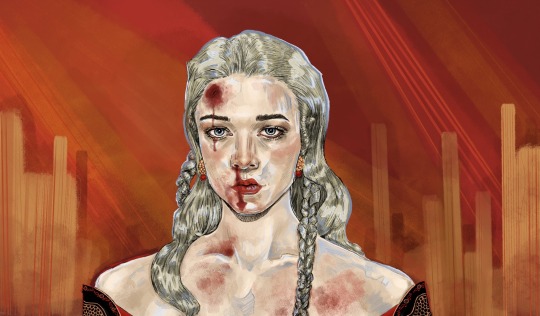
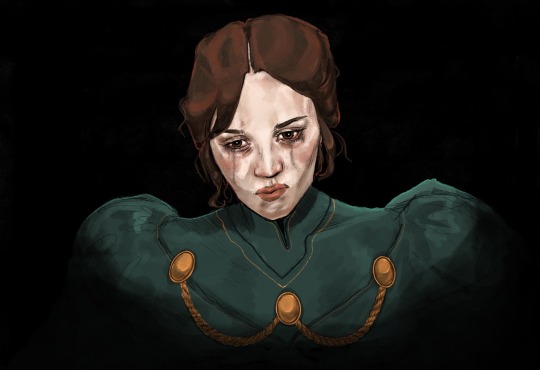
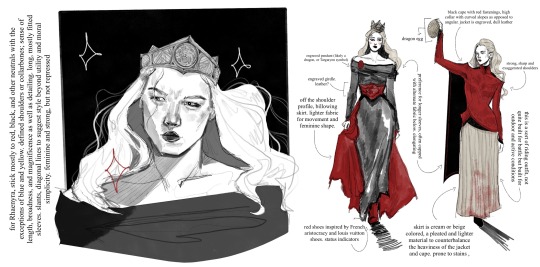
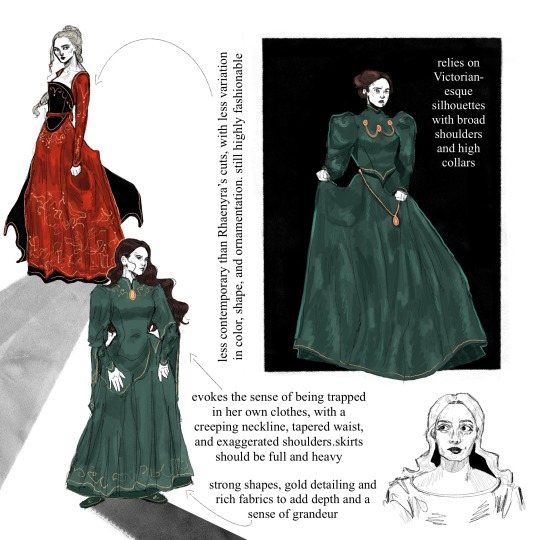

This technically applies to my Stepmother AU in which Alicent is around six years older than Rhaenyra, and occupies a wicked stepmother role as opposed to ex ‘friends-to-first loves-to-enemies’. Despite lacking the foundation of shared girlhood, both find simultaneous comfort and rivalry in one another, and undergo a gravitational pull. A young Rhaenyra’s eagerness to participate in swordplay and political affairs at a young is accommodated for, and she grows up with a sword in one hand and the weight of experience in another, which further helps pave her way to the throne.
Alicent’s Costuming
Alicent’s clothing is almost entirely bottle, emerald, or forest green. While there is layering present in her skirts and jackets, the accent should always be a darker green than the base color. The fabric is deep, rich, and retains an undeniably high-quality luster. Look to velvets and silks. Gold embroidery lingers around her sleeves, neck, and hemline to elevate the coloring.
Metallic embellishments should be almost military-like, and appear heavy. Contribute to the imagery of chains or shackles in addition to her status
Draws inspiration from historically accurate stiffness and Victorian shapes, with a tapered waist, imposing, puffy sleeves, and a high neckline. Despite inaccuracies, this shape is evocative of someone elegantly and conservatively feminine, repressed, and capable of exerting power over others. Reference a classic, trussed hourglass shape. Skirts should be notably heavy and full; may make noise in movement
The coloring and shapes remain relatively consistent but lack variation; this is to demonstrate a lack of freedom and exploration, as well as an adherence to conventional feminine roles
Despite these limitations, her costuming should always be put-together, coordinated, and unquestionably fashionable. Tight sleeve cuffs may be accompanied by a more traditionally medieval fan sleeve
Shoes should stick mostly to slippers, or flat designs
In this AU, her hair leans more towards a dark brown instead of auburn, as her show counterpart. This is mostly due to faux-book accuracy and to simplify the sketch process, since keeping her hair darker in comparison to Rhaenyra’s lighter hair translates more easily in uncolored renderings.
Keep her hair either in a tidy bun or pulled back and loose; avoid too many intricate shapes, braids, or styles. Occasionally, the hair will hang loose. Lean into medieval or royal headpieces, clips, coverings, etc.
Rhaenyra’s Costuming
Rhaenyra’s clothes are primarily black and red, occasionally accented or substituted with neutrals such as beige, white, or gray. Exceptions may include blue or yellow, but she generally stays in this color palette.
Strong focus is drawn to her shoulders and neckline, sometimes with embroidered or embellished detailing. She often has strong, angular shoulders in her dresses or jackets, occasionally theatrically pointed. Off-the shoulder necklines emphasize her collarbones and a certain broadness.
There should be decent variety in her clothing; there is a hypothetical outfit for every occasion and more (for battle, for riding, everyday, formal, feasts, everyday, etc.), and most should be composed of multiple pieces and utilize generous layering. This includes under-fabric, belts and corsets, jackets and doublets, draped fabric for aesthetic purpose, and even functional capes.
Most of her clothes should provide visual aid for movement; additional fabric to her skirts, for example. Her clothes should be highly stylized but still easy to move in. In riding and battle gear, it is presumed that she wears pants and boots under her skirts, even if they are not visible.
Shoes lean more into boot cuts, still practical but should have a sleek and uniform quality to them. When she walks, she should make some kind of noise. Shoes should usually be black or potentially red, the latter for decorative purposes.
Overall her style should be more contemporary and lean into the fantasy element. She’s not opposed to oriental details or showing skin, and her costumes should reflect both couture-height drama and period-reliant aspects. Longer lines and diagonal hems mean she is not as devoted to an hourglass shape, and her high collars should always be decorative in some respect.
Keep her hair long and mostly loose, sometimes pulled back. Small braids should be implied as incorporated. Occasional hairstyles feature complicated braids. With the exception of highly decorative braided styles, simple buns should be avoided unless accompanied with very high necklines.
Avoid headpieces that are not either a) her crown or b) ceremonial.
#rhaenicent#rhaenyra targaryen#alicent hightower#house of the dragon#hotd#rhaenyra x alicent#asoiaf#my art#thinking about how their character and costume designs are so communicative and are designed with each other in mind. for example havijg bc#the strong shoulders and embroidered necklines keeps them connected although imo they could’ve played around with it a lot more#I just have a lot of thoughts about them ok
1K notes
·
View notes
Text


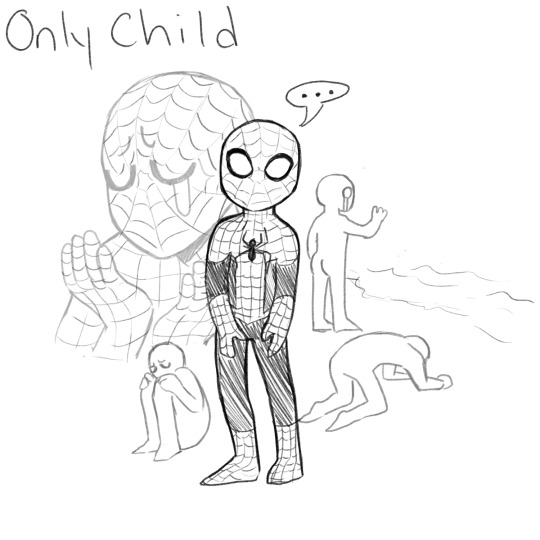

Just my fav heros- kind and empathetic ☺️ agile freaks of nature 🤩 Linchpins of their franchise 🥰🥹💜
Now I just need to find a hero who fits the bill and happens to be a middle child
#dick grayson#peter parker#michelangelo hamato#nightwing#spiderman#tmnt mikey#dcu#marvel#tmnt#dcu fanart#marvel fanart#tmnt fanart#dc comics#marvel comics#tbh dick is a lot more like Leo than he is Mikey#but both Mikey and dick have been called the#Spider-Man of their universe#and it makes sense since they got that charisma#that pulls ppl twords them#and they are kind and incredibly agile#as a middle child I’m offended that I don’t#have an example of a middle child vigilante#who happens to be my fav#maybe I should look into the power rangers or smth idk#gotta catch em all#anywho#i just think their neat#and they have been#the subject of my obbsessions#at some point in my life
481 notes
·
View notes
Text
when two characters starts physically fighting and crashes into a media player which in turn starts playing a random song that becomes the fight track >>>>>>>>>>>>
#this happens a lot but I can only think about poolverine#deadpool and wolverine#deadpool#wolverine#poolverine#the honda odyssey#please give me more examples#movies#tv shows
852 notes
·
View notes
Text

I know those eyes.
[First] Prev <–-> Next
#poorly drawn mdzs#mdzs#wei wuxian#wen qing#wen ning#Sibling similarity but you only see it when you realize they have the same soggy eyes.#These two always struck me as a bit of a play on Jiang Cheng and Jiang Yanli for 'siblings who contrast each other.#But after spending a lot more time marinating on Wen Ning I actually think they are way more similar that is initially apparent.#Sure their surface level personality traits are pretty contrastive. But they both are so willing to risk their lives for what's right#Who raised them? In a story so full of examples of how parents shape their children - why are these two lacking in parents?#I imagine that Wen Qing is the older sibling and so her morals of 'help those who need it no matter who they are' got passed a long.#But how did *she* arrive there? Was that instilled within her or was it a reaction against bearing witness to callousness and cruelty?#We'll never know..the only thing I can say for certain is Wen Qing is *so* soggy in the audio drama.#She's like the ant with the bindle. It's a hell of a way to bring a previously sharp tongued character back into the narritive.#Side note: Thank you all for being so patient and kind while I took my break!#It's been a very chaotic few weeks and I didn't realize how bad my burnout was getting. I'm back and ready to keep drawing again!
2K notes
·
View notes
Text
As much as I adore conlangs, I really like how the Imperial Radch books handle language. The book is entirely in English but you're constantly aware that you're reading a "translation," both of the Radchaai language Breq speaks as default, and also the various other languages she encounters. We don't hear the words but we hear her fretting about terms of address (the beloathed gendering on Nilt) and concepts that do or don't translate (Awn switching out of Radchaai when she needs a language where "citizen," "civilized," and "Radchaai person" aren't all the same word) and noting people's registers and accents. The snatches of lyrics we hear don't scan or rhyme--even, and this is what sells it to me, the real-world songs with English lyrics, which get the same "literal translation" style as everything else--because we aren't hearing the actual words, we're hearing Breq's understanding of what they mean. I think it's a cool way to acknowledge linguistic complexity and some of the difficulties of multilingual/multicultural communication, which of course becomes a larger theme when we get to the plot with the Presgar Translators.
#imperial radch#also a great example of the 'you don't have to be Tolkien' phenomenon#if you want to think about linguistic differences by building all the languages in your setting#and being able to explain what those differences are through actual texts in the language in question#that's AWESOME#but it's not the only way to do it#it's also interesting because of course this style only works in book form#everyone's speaking different languages but in a written account they're all 'translated' for you#but of course if it was a TV series they would all have to be speaking a language the audience understands#(or you *would* have to go wild with conlangs)#and i think that's really cool as well--#how for a series where song is so central we don't actually hear any of the actual in-universe words or any of the music#it's all been filtered#and again you know this is happening but seeing the examples of how real songs--the shape hymns and 'L'homme Arme'--are presented#makes you a lot more viscerally aware of how limited your perspective is#it's good#ann leckie i love you
2K notes
·
View notes
Text
i think L should've tried harder to piss light off. provoking light into slipping up would not only be hilarious i also think it would be extremely easy and effective. not saying you could get light to actually confess this way, but he would definitely make more dumb mistakes if, for example, L kept interrupting their homoerotic brain chess matches to insist that kira is actually matsuda because the butts match
#death note#rookposting#more ideas:#light tweets his detailed and reasoned thoughts on politics and law on his 122 follower twitter account#L uses his 1.4M follower acc to quote tweet him constantly with the word 'wrong' in all lowercase#L makes light watch detective pikachu and keeps going 'you should take notes light-kun i think you could learn a lot from that hamster'#(this one's anachronistic but it works on two levels because light is also irate that L is calling pikachu a hamster)#L keeps 'forgetting' light's name#L listens to light making an argument and stares at him for 0.4 seconds and then turns around like he never spoke#the taskforce gets a dog and L names the dog light. light (person) is now light 2#L keeps countering light's arguments with blatantly nonsensical rebuttals but interrupts him every time light tries to argue back#see L wouldn't do any of this because L is more concerned with playing their gayass game than he is with winning#but if for example L wanted to win instead of lose he should listen to my ideas about offering everyone a cup of coffee except light#because light should really take it easy on the caffeine it's starting to affect his complexion
372 notes
·
View notes
Text

#pikachu#anime#sniffer#here we are with a very nice combination angle#something i would consider both an anime and a sniffer#pikachu is also simultaneously overrated and underrated at the same time#like okay. pikachu is so easy to just see as the pokémon mascot. i think there's a lot of arguments that pikachu is overrated#just because it's the mascot and you see it everywhere. but here's the thing. here's the trick to liking pikachu more#have or know of a really good pikachu OC that you think of every time you see pikachu. for example‚ a pmd character#they're easy examples bc pikachu is playable in every pmd game. then‚ you'll always associate pikachu with that pokémon#and every time you see pikachu‚ you go. holy shit. it's [name of character]#and you start to like it way more. that's what i did. it worked for me#now i love pikachu and i think it's great. every time i get something with pikachu on it because that's 99% of the pokémon merch#that exists on the planet‚ i go. hehe. it is merch of The Character
264 notes
·
View notes
Note
Even if a creator is a bad person it's still okay to like their work. People need to mind their own business.
Honestly it's not really that sort of situation. I'll actively defend Steven Moffat here.
There was a huge hate movement for him back in the early 2010s - which, in retrospect, formed largely because he was running 2 of the superwholock shows at once, one of which went through extremely long hiatuses* and the other of which was functionally an adaptation of an already well regarded show**, making him subject to a sort of double ire in the eyes of a lot of fandom people. Notably, his co-showrunner, Mark Gatiss, is rarely mentioned and much of his work is still attributed to Moffat (and yes, this includes that Hbomberguy video. Several of "Steven Moffat's bad writing choices" were not actually written by him, they were Gatiss.)
People caricatured the dude into a sort of malicious, arrogant figure who hated women and was deliberately mismanaging these shows to spite fans, to the point where people who never watched them believe this via cultural osmosis. It became very common to take quotes from him out of context to make them look bad***, to cite him as an example of a showrunner who hated his fans, someone who sabotaged his own work just to get at said fans, someone who was too arrogant to take criticism, despite all of this being basically a collective "headcanon" about the guy formed on tumblr. Some if it got especially terrible, like lying about sexual assault (I don't mean people accused him of sexual assault and I think they're making it up, I mean people would say things like "many of his actresses have accused him of sexual assault on set" when no such accusations exist in the first place. This gets passed around en masse and is, in my opinion, absolutely rancid.)
On top of that a ton of the criticism directed at the shows themselves is, personally, just terrible media criticism. So much of it came from assuming a very hostile intent from the writer and just refusing to engage with the text at all past that.
Like some really common threads you see with critique of this writer's work, especially in regards to Doctor Who since that's the one I'm most familiar with:
A general belief that his lead characters were meant to be ever perfect self inserts, and so therefore when they act shitty or arrogant or flawed in any way, that's both reflective of the author and something the show wants you to view as positive or aspirational.
An overarching thesis that his characters are "too important" in the narrative due to the writer's arrogance and self obsession (even though this is a very deliberate theme that's stated several times)
A lot of focus on the writer personally "attacking" the fans or making choices primarily out of spite.
A tendency to treat the show being different to what it's adapting as inherently bad and hostile towards the original.
Just generally very little consideration and engagement with the themes, intent, etc. of the shows
This one's a little more nebulous and doesn't apply to all critique but a lot of it, especially recently, is clearly by people who haven't seen the show in like 10 years and their opinion is largely formed secondhand through like, "discourse nostalgia". Which. you know. bad.
I think these are just weird and nonsensical ways to engage with a work of fiction. I also think it's really sad to see the show boiled down to this because that era of who is, in my opinion, very thematically rich and unique among similar shows, and I'm disappointed that it's often dismissed in such a paltry way.
This isn't to say people aren't allowed to critique Steven Moffat or anything, but the context in which he basically became The Devil™ to a large portion of fandom and is still remembered in a poor light is very tied to this perfect storm of fan culture and I just don't agree with a ton of it.
* I'm sure most people have seen the way long running shows and hiatuses will cause people to fall out with a show, with some former fans turning around and joining a sort of "anti fandom" for it while it's still airing. That happened with both these shows. ** Doctor Who will change it's entire writing staff, crew, and cast every few years, and with that comes a change in style, tone, theme - the old show basically ends and is replaced by a new show under the same title. As Steven Moffat's era was the first of these handovers for the majority of audiences, you can imagine this wasn't a well loved move for many fans. *** I know for a fact most people have not sought out the sources for a lot of these quotes to check that they read the same in context because 1) most of them were deleted years ago and are very difficult to find now and 2) many of them do actually make sense in the context of their respective interviews
#and yeah i think the hbomberguy video is kind of bad#I can pull up examples but a lot of what he's saying is very rooted in this sort of critique#maybe most egregiously he sometimes just explains something very poorly or outright incorrectly to make it seem worse or more nonsensical#ex. saying a scene in doctor who 'steals a huge chunk of the plot' when it's less than 30 seconds long#saying two characters randomly start hanging out again while not mentioning the episode entirely dedicated to this#or the way her decision to keep hanging out with him is the emotional turning point of the entire season#etc etc etc.
494 notes
·
View notes
Text
Reading Red Robin is like-
fandom really played like a long game of telephone with this run because almost every popular trope that fanon likes to explore is like taken out of context from red robin
for example, back when i read fanon i would eat up the "Damian cut Tim's line" fics where it's like sad boy Tim and mean Damian and Dick finding out is always such an important plot line in these
but then in the actual book:

Damian cutting his line is a minor moment and immediately followed by them fighting physically with Tim winning
And the only reason Damian even did that is that Tim was still mistrusting him
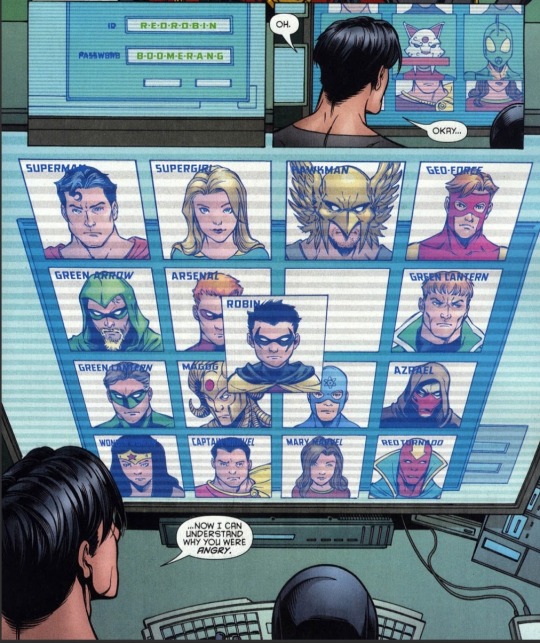
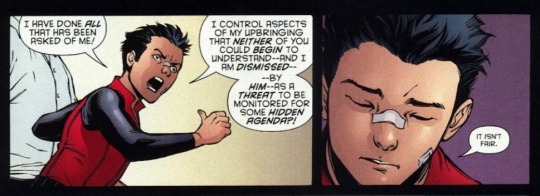
and Dick knows about the whole thing-he helped solve the problem
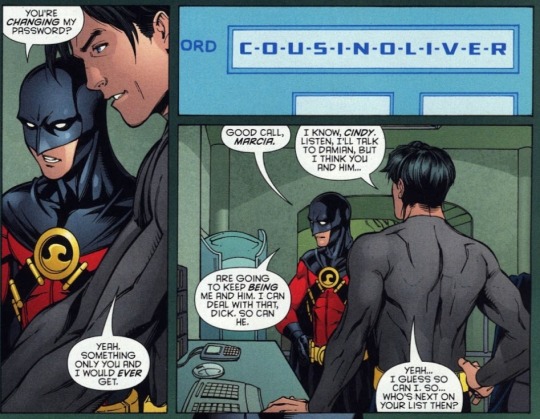
there is also the fanon storyline of like Tim feeling super betrayed because no one believed him until they actually got Bruce back.
which is just. not what happened. at all?
Dick is always willing to believe him
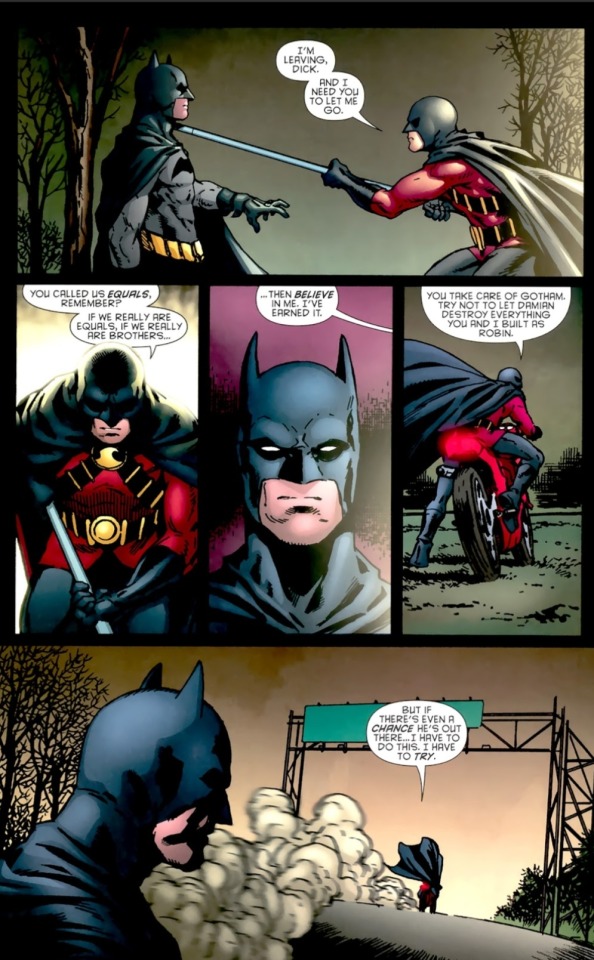
and when Tim actually explains himself Dick listens and trusts him

Then Tim's characterization in fanon is also just like flanderised version of rr!Tim
Fanon is basically someone seeing a vaguely worded list of plot points in red robin and then making shit up from there and it so funny to me
#there are more examples too#like cass running to hongkong wehn greiving#i remember like a lot of that#which she just wouldn't do but whatever#I'm not like shitting on people who make fanwork without reading canon#ok maybe i am a little#it's just funny#cause the run is so good and the fanon interpretations are so bad#tim drake#damian wayne#dick grayson#<- only tagging these three because they're the centres of my main points#second's comic corner
1K notes
·
View notes